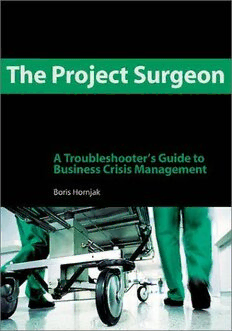
The Project Surgeon: A Troubleshooter's Guide to Business Crisis Management PDF
142 Pages·2001·6.198 MB·English
Most books are stored in the elastic cloud where traffic is expensive. For this reason, we have a limit on daily download.
Preview The Project Surgeon: A Troubleshooter's Guide to Business Crisis Management
Description:
Problem Solver. Troubleshooter. Fire Fighter. If you are an operational manager, you have penciled these on your job description under "other duties not assigned." It seems to be a law of business that the best and brightest end up using their talents to minimize losses and contain damage with only their intuition as a guide. Wouldn’t it be refreshing to have a guidebook aimed at making crisis management easier and, ultimately, more profitable? The Project Surgeon: A Troubleshooter’s Guide to Business Crisis Management—written by career project manager Boris Hornjak—arms the reader with practical tools and methods to solve, not avoid, problems. Using the surgical metaphor and tested project management tools, Hornjak addresses the immediate symptoms of a crisis situation, diagnoses its underlying causes, and builds an enduring crisis-prevention system. Here are a few of Hornjak’s no-nonsense tips: -A crisis behaves like a project. It has a beginning, middle, and an end; and you must resolve it with limited resources. During a crisis, the "vital organs" of the business must continue to function. You do not have the luxury of suspending operations while a solution is found. It’s like flying a plane rather than driving a car—when the engine blows, you can’t pull over, open the hood, and act befuddled. You have to fix the problem while attempting to land safely. -Triage your problems. Look over the corporate battlefield, and fix those problems with the best chance of survival. Don’t treat the most difficult problems—they’re DOA. Don’t waste time on the easy problems either—they can survive on their own. With this approach, a large number of simultaneous problems become manageable. -Protect all critical points. Critical points are those work components that are highly important and have a high impact if failure should occur—their loss makes a big difference in crisis recovery. The most common critical points in business are your best people, who are by and large overworked and overstressed. Look around in your organization—the best people are always in a crisis-management mode, on the firing lines. In the meantime, the losers lead a life of relative ease. Work hard to divert crisis-impacts away from your best performers.
See more
The list of books you might like
Most books are stored in the elastic cloud where traffic is expensive. For this reason, we have a limit on daily download.
